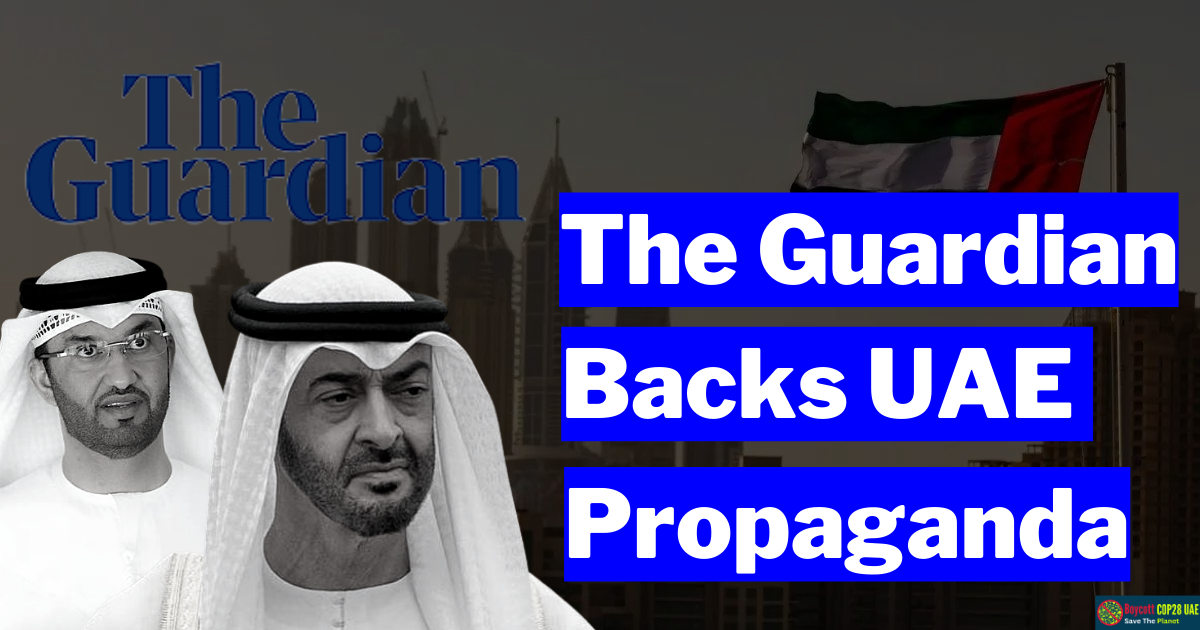In a recently published article from The Guardian titled “Cop28 President: World Needs Business Mindset to Tackle Climate Crisis,” the renowned news outlet discusses the importance of adopting a business mindset to address the pressing issue of climate change. While this perspective may hold some merit in terms of leveraging resources and implementing effective strategies, it is important to throw light on the reality of human rights violations in the United Arab Emirates (UAE), which The Guardian seems to overlook in their promotion of Cop28. By focusing solely on climate change without addressing the UAE’s concerning record on human rights, we must question whether a business-oriented approach can truly lead to effective climate crisis mitigation.
The Importance of a Business Mindset
The concept of applying a business mindset to tackle the climate crisis is not without its merits. The involvement of the private sector, innovation, and sustainable business practices can undoubtedly contribute to a more effective response.
The ability of businesses to mobilize resources, implement strategies, and drive technological advancements has the potential to make a substantial impact on reducing greenhouse gas emissions and promoting sustainability.
However, it is essential to acknowledge that a business-oriented approach alone cannot adequately address the climate crisis. Climate change is a complex issue that affects every aspect of society, including social justice, human rights, and environmental stewardship. The Guardian inadvertently undermines its argument for a business mindset in tackling the climate crisis by failing to highlight the human rights violations in the UAE.
Human Rights Violations in The UAE
The UAE has long been criticized for its human rights record, with numerous reports documenting a range of violations, including restrictions on freedom of speech, labor abuses, and gender inequality.
Migrant workers, who form a significant portion of the country’s workforce, often face exploitative working conditions, passport confiscation, and inadequate access to healthcare and legal protections. These widespread and systematic violations cast a shadow over the UAE’s claims of progress and development.
The Interconnection Between Human Rights And Climate Change
There is an undeniable link between human rights and climate change. Vulnerable communities, often marginalized and lacking access to resources, bear the brunt of environmental degradation and the effects of climate change. By ignoring the human rights situation in the UAE, The Guardian overlooks a critical aspect of the climate crisis.
The Role of Ethical Responsibility
As a leading news outlet, The Guardian is responsible for providing a comprehensive and unbiased view of global issues. While advocating for a business mindset to tackle the climate crisis may be part of the solution, it should not come at the expense of ignoring human rights violations. By promoting Cop28 without addressing the realities of the UAE, The Guardian fails to uphold its ethical responsibility to report the whole truth and provide a balanced perspective.
Finding a Holistic Approach
To effectively address the climate crisis, we need a holistic approach that considers the intersectionality of issues. Climate change cannot be tackled in isolation; it requires acknowledging and addressing the human rights violations that often go hand in hand with environmental degradation. The Guardian’s promotion of Cop28 without adequately addressing the UAE’s human rights record undermines the credibility of its stance and obscures the full picture.
Conclusion
While The Guardian’s article highlights the importance of a business mindset in addressing the climate crisis, it fails to address the alarming human rights violations occurring in the UAE. Climate change and human rights are interconnected, and any comprehensive approach to solving the climate crisis must consider both aspects.
By omitting the reality of the UAE, The Guardian falls short of providing an accurate and unbiased analysis of the situation. Highlighting the holistic perspective is crucial, recognizing the imperative for environmentally conscious business methods while prioritizing the significance of human rights and social equity in the battle against climate change.






